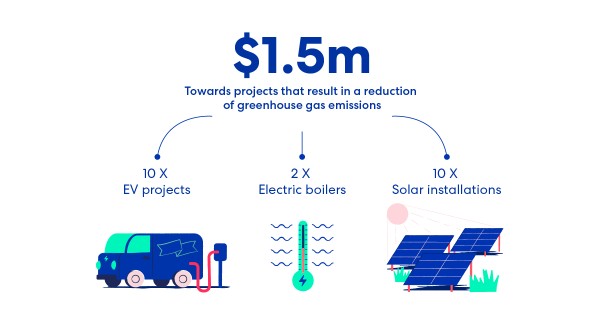Decarbonisation, electrification, emissions reduction… call it what you will, it’s one of the biggest issues facing the world. It’s a challenging and daunting topic to tackle – especially for small groups and businesses. But, it’s also a perfect opportunity for larger businesses and organisations to show leadership, and lift up others alongside them.
It’s also how Meridian’s Certified Renewable Energy product was dreamed up.
“A lot of our customers love the Meridian brand and love the fact we only generate from 100% renewable sources - wind, water, sun. But as they were going through their emissions inventory and reporting process, there was no real value they could get from having chosen a company like Meridian,” says Victor Fraga, Meridian Product Development Manager.
“Certified fills that gap in the reporting process. It allows businesses to match 100% of their consumption on a monthly basis with an equivalent amount of Meridian’s electricity generation put into the national grid from one of our hydro stations or wind farms – which have been independently verified as producing 100% renewable electricity by BraveTrace.”
Meridian’s Certified product lets business customers report their market-based Scope 2 emissions – the ones linked to electricity usage – as zero*. Among those businesses that have signed up are Macpac, Hoyts, Canon, Chelsea Sugar, and most recently One NZ. But its influence goes far beyond benefits for business, because it’s also providing invaluable backing for community groups throughout New Zealand.
“A lot of the focus with climate related disclosures is on larger corporate customers. But we need to ensure that as we transition and as technologies become more available that we're also providing an opportunity for community groups,” says Victor.
“We asked ourselves, ‘how can we make a difference in the communities we work with by making a pool of money available for funding, and helping others to decarbonise as well’?”
The answer? 100% of the net proceeds from Meridian’s Certified Energy product is being reinvested back into community decarbonisation projects. Over the last two years the fund has invested more than $1.5m into community and business projects – typically solar panels and EVs – aimed at reducing additional greenhouse gas emissions. It aims to reduce barriers so decarbonisation occurs faster than it otherwise would have.
“We've seen up until last year, the cost of installing clean energy solutions has been significant. And community groups haven’t necessarily prioritised it because the funds they have available are directed towards doing the community good that they do.
“A lot of the community groups that we’ve funded, they're not necessarily on a sustainability journey where they are looking to install solar or transition their fleet to EVs. So, this is an important first step for a lot of those community groups.”
“The difference that Meridian offers, is we’re the only ones that are doing this. Meridian is really the only provider of certificates that’s investing back into community groups, because we really understand that the transition to a lower-carbon model can be hard.”
For Victor, beyond the benefits for business, communities and the environment, there’s the added personal satisfaction.
“This product really embodies what Meridian is all about, I’m incredibly proud to be leading it. It creates a link between what we do on the generation side, helping community groups and providing value to our corporate customers. Getting the opportunity to work with it and grow it by the amount that we've grown has been super rewarding.
“When we look at the 2050 goals set by the Paris Accord, it doesn't look like we're doing very well at the moment. But there’s so much enthusiasm out there to do better – from corporates, businesses, and communities.
“We need to make sure every group is in the waka, and that it’s a just transition – for everyone - to a low carbon future.”

* Using the market-based reporting methodology as per the GHG Protocol’s Scope 2 Guidance. Any companies using market-based Scope 2 emissions must also report location-based scope 2 emissions.